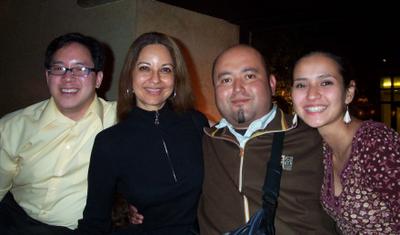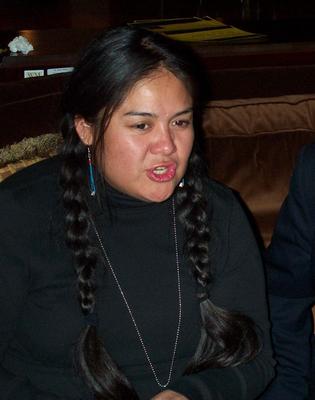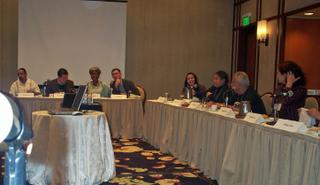Boomers and Busters
 From left: Ming Luke, assistant conductor of the Sacramento Philharmonic Orchestra; Margo Aragon, TV host in Lewiston, Idaho, and WESTAF trustee; Samuel Aguiar Iniguez of Sacramento, English teacher, film maker, poet, rapper, photographer, and playwright; and Tatiana Reinoza, artist and independent curator in Sacramento.
From left: Ming Luke, assistant conductor of the Sacramento Philharmonic Orchestra; Margo Aragon, TV host in Lewiston, Idaho, and WESTAF trustee; Samuel Aguiar Iniguez of Sacramento, English teacher, film maker, poet, rapper, photographer, and playwright; and Tatiana Reinoza, artist and independent curator in Sacramento.I have been surfing a wonderful wave ever since the conclusion yesterday of WESTAF's symposium, "The New Face of Arts Leadership in the West." The wave took shape Thursday night when co-facilitator Shane Moreman busted the boomers in a hilarious and insightful rant against my generation. Tony Garcia, executive director of Su Teatro Theater Company in Denver, on Friday continued co-facilitator Brenda Allen's eloquent Boomer response, grousing that "I'm not dead yet," even though sometimes it seems the younger crowd can't wait to move him out of the way in the organization he founded. Tony was recently described in a Denver Post feature as no longer being an angry young man. "It's true," he told us. "I'm happy. I'd be happy to kick your ass if I needed to." The boomer back and forth informed much of the the symposium, and I loved it. Viewing my generation from outside itself gave me a joy similar to my delight in viewing the U.S. from France. It's like a fish getting his first look at water. A creative moment that releases intellectual and emotional energy.
An ironic aspect of this gathering of young, diverse arts leaders was their assertion of the need to "honor the elders," a concept which, decades ago, did not have a lot of resonance for my gang, who made a fetish of not trusting anyone over 30. An eloquent spokesman for the elders was Annette Evans Smith, who works at the Alaska Native Heritage Center in Anchorage. A Stanford graduate of Athabascan, Yup'ik and Alutiiq descent, she described herself as "a daughter turning into a mother" (she is due in May), and she firmly refused the emerging feel-good concensus that this was a gathering of young leaders who would change the world. "I am not a leader," Annette said. "I will not be a leader until I am a grandmother. My job is to keep our native languages alive for another 10,000 years. If this had been a room in my community, I would have asked permission to speak from my elders first."
This is not to say that the young dynamos at the Symposium are missing the chance to find their own ways through what James Early of the Smithsonian called "this global moment." Shawna Shandiin Sunrise, a fifth-generation Navajo weaver, told of a time when she was dressing in full punk-rock regalia and had to fill in for her mother to teach a weaving class in Taos. The adult students were shocked at first and understandably resistant--until Shawna's skill became evident. "I helped them fix their knots," she said simply. "After that, they saw me as who my mother brought me up to be." I feel my eyes moisten again as I type that quote, which seemed to happen every time Shawna took the wireless mic. She and others made vivid the tragedy of human cultures simply disappearing, especially through their languages. Against that backdrop here in the U.S., she had a chance to visit New Zealand, where the Maori culture has been affirmed and brought back during the past 30 years. "When we got off the plane, we took a bus to a hall where we were greeted by 600 children singing in Maori," she told us. "I listened to them for my mother. I listened to them with my mother."
"this global moment." Shawna Shandiin Sunrise, a fifth-generation Navajo weaver, told of a time when she was dressing in full punk-rock regalia and had to fill in for her mother to teach a weaving class in Taos. The adult students were shocked at first and understandably resistant--until Shawna's skill became evident. "I helped them fix their knots," she said simply. "After that, they saw me as who my mother brought me up to be." I feel my eyes moisten again as I type that quote, which seemed to happen every time Shawna took the wireless mic. She and others made vivid the tragedy of human cultures simply disappearing, especially through their languages. Against that backdrop here in the U.S., she had a chance to visit New Zealand, where the Maori culture has been affirmed and brought back during the past 30 years. "When we got off the plane, we took a bus to a hall where we were greeted by 600 children singing in Maori," she told us. "I listened to them for my mother. I listened to them with my mother."
Samuel Aguiar Iniguez, who e-mailed me the photos I'm posting here, inspired me with his indefatigable work in the arts. He created his own time-management system, based on daily, weekly, monthly, and annual agendas which he uses to assure he will have time for his own art. At 33, he mentors younger artists by stressing the values his father taught him, such as "keep your word." Organizations like WESTAF and the state arts councils are great, doing good work. But we seriously fool ourselves if we think that our disappearance would keep Samuel from creating his next film or play or bohemian rap piece. He is simply unstoppable.
By the end of the two days, the Boomer topic has pretty well played out. In fact, when we divided up into five discussion groups, only two people attended the topic of "Baby Boomers: Problem or Opportunity." One of them, Ricardo Frazer, Seattle hip hop impresario and WESTAF trustee, noted that he had been a presenter at last year's symposium in Los Angeles, speaking on behalf of youth, but this year's even younger collection of speakers made him feel he had aged several years. He spoke of mentoring and recommended, "Instead of moving a boomer out of the way, I think you should grab hold of a boomer and ride that horse until it dies." Sounds good to me.
"Baby Boomers: Problem or Opportunity." One of them, Ricardo Frazer, Seattle hip hop impresario and WESTAF trustee, noted that he had been a presenter at last year's symposium in Los Angeles, speaking on behalf of youth, but this year's even younger collection of speakers made him feel he had aged several years. He spoke of mentoring and recommended, "Instead of moving a boomer out of the way, I think you should grab hold of a boomer and ride that horse until it dies." Sounds good to me.
WESTAF didn't invent the power of youth and difference. All we did at this event was to bring a very diverse bunch of young people together, feed them, put them up in a fancy hotel with soaking tubs in the rooms, and stand back and watch the show. The result was, for this boomer, incredibly satisfying. On the first night, I'd pointed out to Brenda Allen, our black Boomer goddess co-facilitator, that she and I had been born in the same year, 1950, along with Stevie Wonder, whose music I'm listening to as I finish this. "It was a very good year," I told her as I reached up to give her a hug as the room cleared yesterday.
I'll give Stevie the last words, in these stanzas from his CD titled Natural Wonder:
Oh, I could rattle on about the good old days
And how life used to be
And even inwardly relive them vividly
But the best advice I can give to you
Is that we only go around one time
Treat each day like this is it
And give it the best you canMs. & Mr. Little Ones
Look what's happened to our world
Ms. & Mr. Little Ones
We're so sorry
There's so much we should and should have never done
That's why we're beggin' on our knees
Please! Forgive us for what we've done
Ms. & Mr. Little Ones
Ms. & Mr. Little Ones
